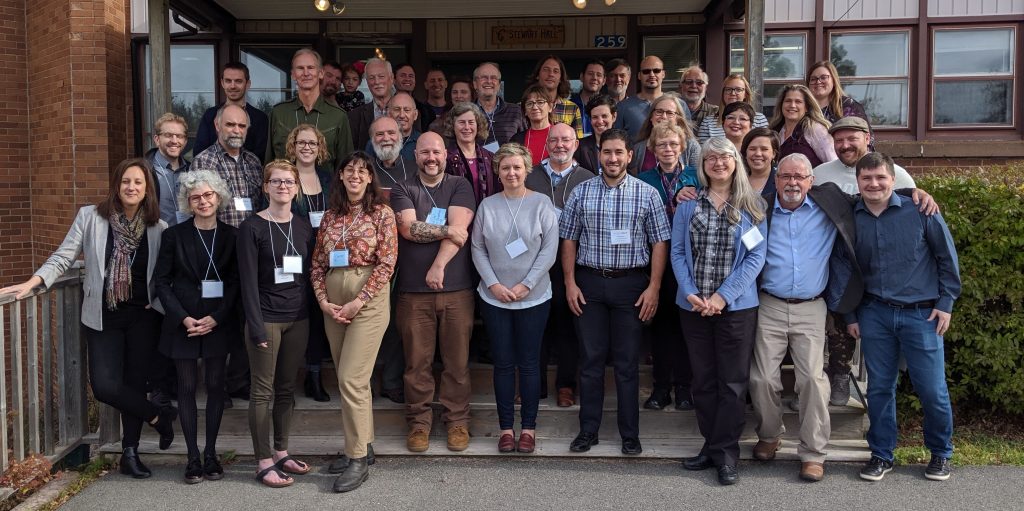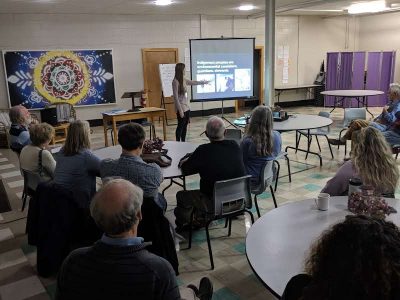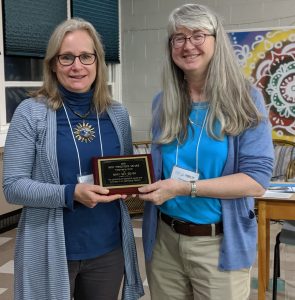
By Kenzie Love and Hazel Corcoran
CWCF concluded a successful conference in Tatamagouche, Nova Scotia, which offered both valuable new insights in forums and workshops and the familiar social and networking opportunities participants have come to expect.
The conference kicked off with a land acknowledgement, welcoming remarks by CWCF President Reba Plummer and CoopZone President Pascal Billard, and an icebreaking activity in which participants shared in small groups and played “human bingo.”
We next moved on to the two all-day intensive sessions. Feedback on the “Human Issues in a Worker Co-op” Intensive was very positive; please see separate article on this session. Amine El Hafa, Senior Development Officer with the Cooperation Council of Ontario, commented on the CoopZone Developers’ Network Intensive that “Participants appreciated the topics discussed because of their diversity and complementarity. We talked about the circular economy, cooperation and our future, the succession of businesses through the cooperative model, and financing for co-ops.” Presentations which are available online include Tom Webb’s session on Co-operation and Our Future: Peripheral or Central, Christina Baker’s on the Canadian Co-operative Investment Fund: Financing that Works for Co-operatives, Greg Watson’s on the North Nova Forestry Co-op, and Pascal Billard’s on L’économie circulaire: Génératrice de nouvelles entreprises.

The first day concluded with keynote speaker Hannah Martin on the challenges posed by climate change and the issues facing First Nations communities. As expected, her address was a highlight. Key themes were the importance of the land, environmental racism with Indigenous peoples often feeling the worst impacts of climate change, and the concept of “two-eyed seeing” as part of the solution. Two-eyed seeing is a Mi’kmaw concept of acknowledging the distinct ways of knowing of Indigenous people and also of settlers, as a framework for respectful cross-cultural collaboration. Amy Proven of Sun Certified Co-op observed: “As an indigenous woman myself, I was so proud of her passion, determination, intelligence and her love for family and culture. Our country needs more people like her to help all people understand the work that needs to be done in our future to reconcile our past and to take care of our earth.”

That same evening featured the presentation of the Worker Co-op Best Practices Award to Open Sky Co-operative of Sackville, New Brunswick for its work providing residential, vocational and social supports to adults who face barriers due to developmental, mental health or social challenges. The Co-op’s best practice is the exemplary way in which it lives the co-operative values and principles, and its inspiring story is told in this 6-minute video. The Award was accepted by the Co-op’s Executive Director, Margaret Tusz-King.
The evening wrapped up with participants viewing a video called The Great Laws of Nature: Indigenous Organic Agriculture featuring the Muskoday Organic Workers’ Co-op in Saskatchewan, singing around a bonfire, and socializing.
Day two started off with the Forum on Building Resilient Communities, the Conference theme, looking at community resiliency from various lenses: environmental/ climate change, social, and in First Nations communities. Eric Tusz-King ably provided the framework for how (worker) co-ops can help to build community resiliency and introduced the three panellists. The first, Colin MacDougall from Sustainability Solutions Group, stressed that there is room for worker co-ops to do better in our own sustainability practices. Using a compare and contrast approach, the lessons he shared for worker co-ops included:
- Be efficient so you have space for sustainability practices.
- You must literally put items you want to give attention to on the agenda. Embed it, but don’t embed it to the degree it’s taken for granted.
- Worker co-ops must not stay in a silo.
- The way we do this is to measure what we do, e.g by working with Climate Smart. What gets measured gets done.
Next, Margaret Tusz-King spoke of the practices at Open Sky Co-op. Open Sky has honed an adult education model grounded in co-op values and principles which is focused on mental health and meeting the challenges of their members who face various barriers. Margaret explained that their approach focuses on building all of the following: “the ability to be well, to cope and adapt; to be able to change in response to challenges, having meaning and purpose, having skills. Having a sense of self-trust and the sense that “I will survive.” It also means having respectful relationships, being able to accept truth, being able to make appropriate changes, to address conflict, to give and receive feedback, to share risks, to follow through, to be able to give people the benefit of the doubt. The skills underneath those include the need to understand mental health. Fostering and enabling personal growth in each other. Looking at each other as growing beings, including self-awareness. Needing to know what your weak points are. Our people like 3-step processes! Doing first things first. Getting enough sleep, and nutritious food. Opportunity for fun and leisure, having friends. People also need good health, and enough money to cover basic needs. The framing is: prioritizing and building in time for the things that are important. We all need a balance of safety, support and challenge in our lives.”
Lastly, in this Forum Nadine Bernard, a Mi’kmaw woman from We’koma’q now living in Sydney, spoke to co-operation in Indigenous communities as a fundamental aspect of Indigenous resiliency. Eight years ago, she conceived of and started “Slow-Cooked Dreams” to help teach people how to cook nutritious meals on a budget. She teaches not only meal planning and preparation but at the same time life skills in line with the holistic health elements of the Medicine Wheel: physical, mental, emotional and spiritual/ community. She works primarily with First Nations people to help address intergenerational trauma. She spoke of her personal experiences and the need to “unlearn everything she had been taught,” which she noted is also true for “mainstream Canada”.
Participants clearly found the approaches to resiliency and transformation presented by Margaret and Nadine to be very inspiring. Hopefully, participants found the challenge posed by Colin around sustainability practices to be a call to action. Certainly the break-out groups after each panellist generated animated discussion.
Day two also featured the always popular co-op ignite sessions, brief and dynamic presentations. As one participant said, “I really enjoyed these sessions. I find it helpful and very interesting to learn more about CWCF’s members!”
The day’s activities continued with a choice of workshops, “Member Peer Coaching” and “Building Your Co-op’s Financial Viability”. One participant in member peer coaching commented: “I couldn’t believe how valuable this little tool was…and it seemed many people took this again after it was held last year. I enjoyed the people I was grouped with & felt I gained a great tool to bring back to my co-op & other co-ops around Vancouver. We all ended up with 5-6 NEW ideas to try on our issue. Really simple but very effective.” The Financial Viability workshop dove into the complexity of this topic, with a focus on the importance of managing cash flow, and the overview can be viewed here. The final sessions were a presentation by Wendy Carruthers of The Co-operators, introduced by Board Chair John Harvie, on their Journey to Environmental Sustainability and Climate Leadership (available here), and the first part of the AGM.
Day two concluded with the mix ‘n mingle networking party, which one participant complained “needed a bigger dance floor!”
The final day saw participants take part in the second forum, facilitated by Wilf Bean, on the Social and Solidarity Economy and Worker Co-ops. Sonja Novkovic of St. Mary’s University presented a high-level overview of the concepts of Social Economy, Social Enterprise, and Solidarity Economy, available here. She clarified that the Solidarity Economy “looks for alternatives centred on redistributive justice, deep sustainability, active citizenship and a more profound reconfiguration of power relations.” It is in the Solidarity Economy which seeks fundamental transformative change in the economy, and worker co-ops can push the agenda in this space by partnering with other values-based enterprises. The clarity in this presentation reinforced CWCF’s focus in its third strategic pillar of “Building the Solidarity Economy.” Rick Proven then provided a concrete example of Sun Certified Builders Co-op partnerships with social enterprises in Manitoba, for mutual benefit. Again, after both presentations there was very animated discussion in the small groups. The reporting back process enabled us to capture some innovative ideas to bring back to the implementation of our strategic plan.
Lastly, we concluded the AGM, participated in more Ignite sessions, and had the facilitated wrap-up of the Conference.
We must not gloss over the fact that there are challenges in the worker co-op sector in Canada, and these were raised at the Conference. One is that there have been several worker co-ops which ceased operating in the past year; in some but not all cases for financial reasons, and several others are struggling. Another is that we need to do more to promote the worker co-op model. An activity woven through the Conference raised a variety of challenges worker co-ops face, and the most salient ones were around engaging members of worker co-ops. Importantly, it was raised that the worker co-op sector needs to become more diverse and inclusive, notably regarding people of colour. The Board is seeking creative ways to address all of these challenges. If you have suggestions for CWCF, notably but not only on creating a more inclusive movement, please share them with Hazel Corcoran, hazel@canadianworker.coop.
One key follow-up to the Conference in the Atlantic region is that the Atlantic caucus decided it would hold an all-day meeting on December 4th, in Wentworth, Nova Scotia. There was a strong commitment from worker co-operatives, Saint Mary’s University, and CDR – Acadie to increase the promotion of worker co-operatives and their collaboration with co-operatives to help build resilient communities within a solidarity economy. If you are in the Atlantic region and wish to participate, please contact: Eric Tusz-King (erictuszking@gmail.com or 506-536-7215).
With all of the learning opportunities (and some opportunities for play), one delegate observed that the conference’s impact would extend beyond 2.5 days — and he was pleased about that. “I often reflect on the value of a conference based on what actions and ideas I want to implement when I get back,” said London Brewing’s David Thuss. “This year’s CWCF Conference far exceeded my expectations as I have so many things to do in the wake of it. From the inspiring stories of cooperatives all along the spectrum from newly founded to mature, the embracing of Principle 6 by so many in sharing their resources, to the engaging and well-planned sessions each day this Conference has brought a wealth of value back to the London Brewing Co-operative. Things certainly got off on the right foot with the ice-breaker session and there was real community building as the conference focused on participants with the evening planning. I look forward to my next opportunity to visit with many of the new contacts I have in the larger worker co-operative community in Canada.”
Amy Proven of Sun Certified Co-op reflected that, “Being a co-op has had many struggles. Our business of building sustainable structures is a constant uphill battle, so I attended the workshops on Conflict/Human Resources and Money management. My observation was, no matter what the business of the co-op, we all face many of the same struggles across Canada. Bringing the worker co-ops together to talk and learn about our various experiences is very important for our morale and learning. We are not alone. Now we have many contacts from coast to coast and a network of other co-ops that we can reach out to.”
Here’s hoping everyone found the conference similarly impactful, and if you didn’t attend that the summaries and presentations are of use to you. See you next year in Vancouver!